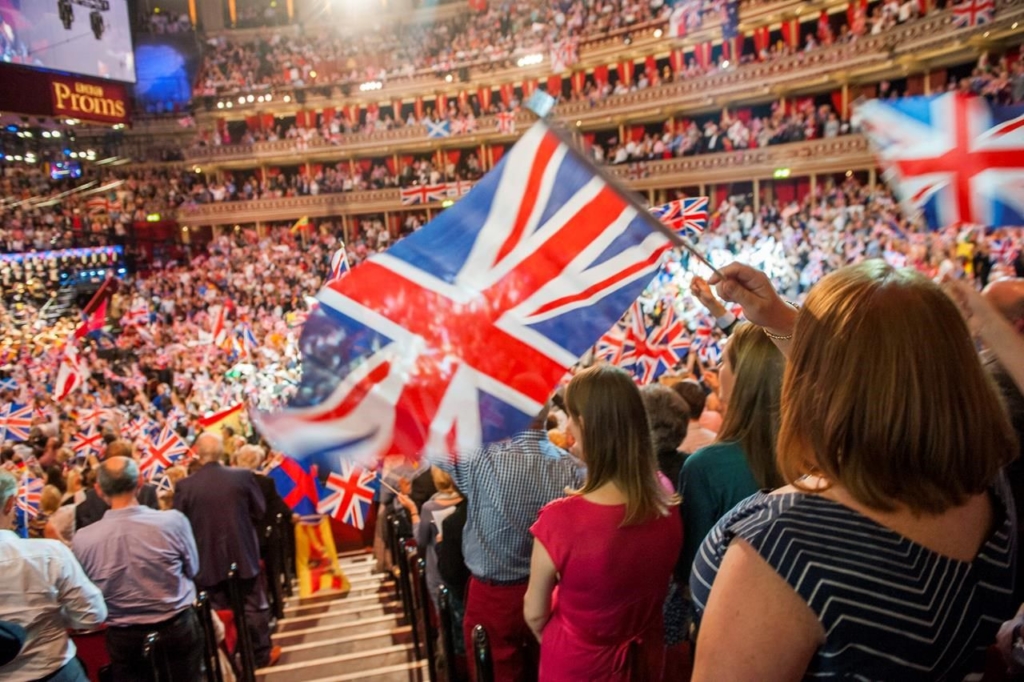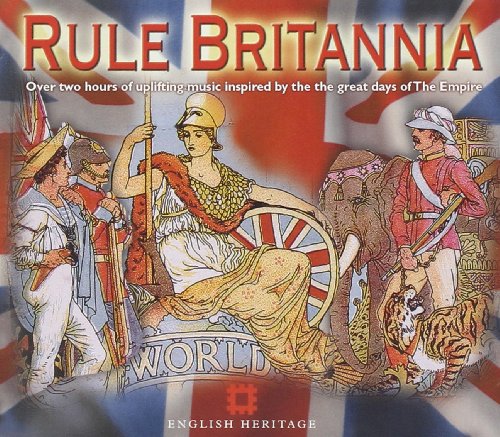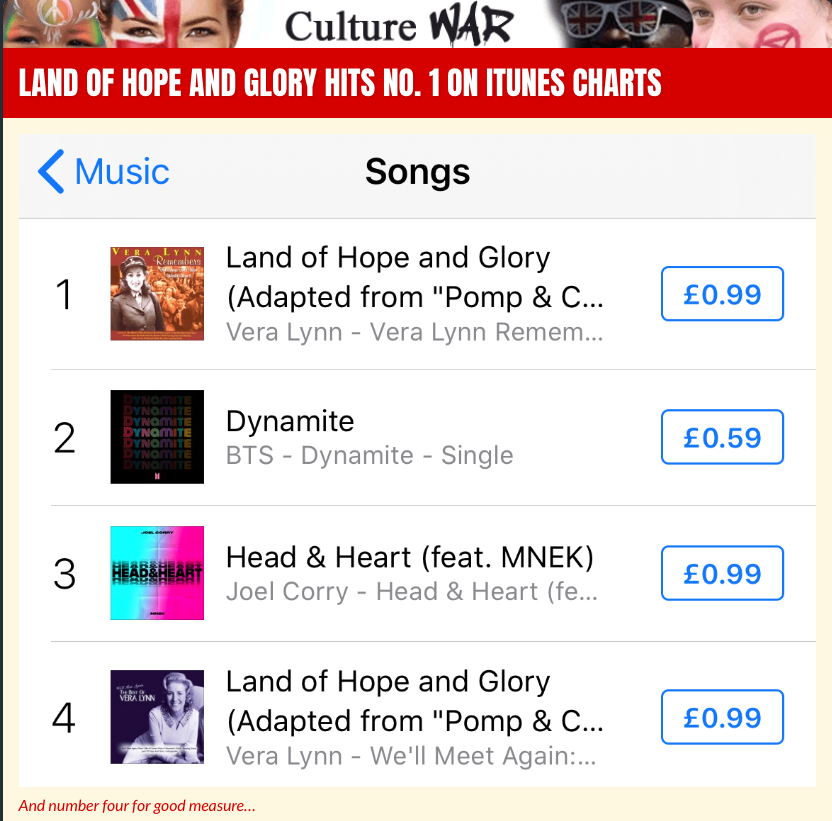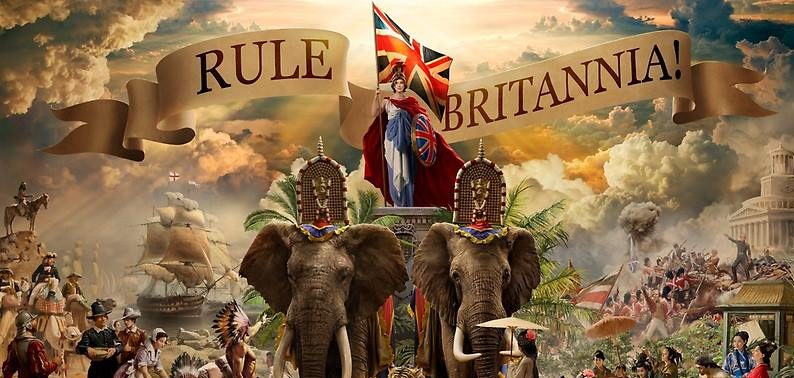Land of Hope and Glory

This week saw a perfect example of two bizarre phenomena: the super-quick cycle of a bogus media outrage at a non-existent Cancel Culture, and a deeply troubled Anglo-British society managing to mine grievance out of the ether. On Sunday The Sunday Times suggested that “Rule, Britannia!” and “Land of Hope and Glory” were to be left out of The Last Night of the Proms programme to placate the Black Lives Matter movement. Cue outrage and much gnashing of teeth.
The entire ‘Rule Britannia’ fiasco is a Perfect Storm of nationalism, jingoism and misplaced hurt super-boosted by the Mood Music of Brexit and social media. We had retired Tory John Redwood playing to type squealing: “Typical of the BBC to refuse to sing Britons never never never shall be slaves. They do not even agree with the rest of us that we can unite in a song condemning slavery and tyranny“. Getting in on the act professional moron Piers Morgan pointing to a letter in The Times of the actual Commodore of the Royal Navy wailed: “THIS is why we sing Rule Britannia with such pride & gusto. Don’t let the wokies cancel what made us Great Britain.”
Marking a full-house, senior BBC broadcaster and far-right activist Andrew Neil barked:
“If Britannia had not ruled the waves there would never have been a Royal Navy strong enough to abolish the slave trade, intercepting 1,600 ships and freeing 150,000 Africans while sustaining major casualties.”
As the writer and broadcaster Gavin Esler patiently explained : “Rule Britannia was written in 1740 at the peak of the slave trade when British vessels transported a total of 3 million Africans to the New World as slaves. To suggest it condemns “slavery and tyranny” is quite the stupidest comment in the stupidest row of 2020.”
This morning Nigel Farage teamed up with Eamonn Holmes on national tv to explain to Femi Oluwole, a black man, why he can’t possibly find the word ‘slave’ offensive. Predictably the former revolutionary, now Koch-funded shill Brendan O’Neill chipped in whining: “We have to stop being ashamed of British history. The BBC is censoring Rule Britannia. The British Museum is banging on about slavery. We’re all expected to atone for the sins of Empire. It’s pathetic. Let’s celebrate what’s good about Britain.” Even the elusive Prime Minister broke cover to complain about the crisis …
“I think it’s time we stopped our cringing embarrassment about our history.”
Boris Johnson says we need to “stop this general bout of self-recrimination and wetness” amid suggestions that songs like ‘Rule, Britannia!’ may be replaced with orchestral versions by the BBC. pic.twitter.com/2ylYGvmQjY
— Channel 4 News (@Channel4News) August 25, 2020

The Prime Minister – who has been AWOL for weeks – is enthusiastically turning the whole affair into a Trump-style culture war, feeding the bored tabloids with a flurry of headlines while England’s favourite hate-blog Guido Fawkes leads a (successful) campaign to put Vera Lynn’s rendition of “Land of Hope and Glory” at the top of the iTunes charts.

Britain is facing economic ruin and people are facing mass unemployment and daily destitution, yet the issue that really motivates outrage and energises the political and media class is the content of the Last Night of the Proms (an event at which there will be no ******* audience).
This is a further descent into a culture of sub-fascism and hyper-nationalism, it’s a society steeped in nostalgia and drenched in exceptionalist grievance culture imagining itself under-attack from “woke culture” and something called the “Leftwaffe”. It evokes a swirling mass of tropes and imagery from the idea of England being “under attack” to the “left wing BBC” and gives permission to a barrage of racism and re-writing of history.

This inability to (in any way) confront the past (or adapt at all) is the hallmark of a nation in its End Days. Britain, by which I mean England, is obsessed by itself but is also seemingly incapable of having a conversation about itself. As Johnson’s government spins out of control with u-turn after u-turn suggesting an administration lacking in basic ministerial competence there is also, as Peter Geoghegan writes; “less a whiff of corruption about this government and more a stench so powerful it can no longer be ignored.” But ignored it must be and as the Union nears its end-point and England commits the greatest economic self-harm in its history we can expect much more of this.
The backdrop is of course Brexit and the re-writing of history is mirrored neatly with a projection forward to a mythical Independence Day, Johnson as a sort of inept Trump, a bumbling Perón. As ‘Britain’ descends into further chaos the need to go to more and more extremes to fabricate a glorious past will become more desperate to obliterate the grim reality of the present.

As Winnie Ewing used to say “Britannia waives the rules”
Brilliant article.
Rule Britannia… Was it not written by the Jeddart poet, Jemmy Tamson, and Davie Malloch, the son of a Perthshire Jacobite, as part of the libretto of a masque that celebrated the victories of the ancient hero-king of Wessex, Alfred the Great, over the Vikings? I believe the Covent Garden impresario, Thomas Arne, later remixed it as an all-sung oratorio in 1745 and then a full-blown opera in 1753.
Meanwhile, Malloch himself again altered the lyrics. This remix, which he called Married to a Mermaid, became extremely popular when Malloch produced his masque of Britannia at Drury Lane in 1755 and was much bowdlerised over the subsequent decades by British sailors.
There was a gay young farmer,
Who liv’d on Salisbury plain;
He lov’d a rich Knight’s daughter dear!
And she lov’d him again.
The Knight he was distressed,
That they should sweethearts be.
So he had the farmer soon pressed,
And sent him off to sea.
Singing, ‘Rule, Britannia,
Britannia, rule the waves
Britons never, never, never shall be slaves…’
‘Twas on the deep Atlantic,
Midst Equinoctial gales;
This young farmer fell overboard
Among the sharks and whales;
He disappeared so quickly,
So headlong down went he,
That he went out of sight
Like a streak of light
To the bottom of the deep blue sea.
Singing, ‘Rule, Britannia,
Britannia, rule the waves
Britons never, never, never shall be slaves…’
We lowered a boat to find him,
We thought to see his corse,
When up to the top he came with a bang,
And sang in a voice so hoarse,
‘My comrades and my messmates,
Oh, do not weep for me,
For I’m married to a mermaid,
At the bottom of the deep blue sea.’
Singing, ‘Rule, Britannia,
Britannia, rule the waves
Britons never, never, never shall be slaves…’
He said that as he went down,
Great fishes he did see;
They seemed to think as he did wink,
That he was rather free.
But down he went so quickly,
Saying, ‘Tis all up with me, ‘
When he met a lovely mermaid
At the bottom of the deep blue sea.
Singing, ‘Rule, Britannia,
Britannia, rule the waves
Britons never, never, never shall be slaves…’
She came at once unto him,
And gave him her white hand,
Saying, ‘I have waited long, my dear,
To welcome you to land.
Go to your ship and tell them,
You’ll leave them all for me;
For you’re married to a mermaid
At the bottom of the deep blue sea.’
Singing, ‘Rule, Britannia,
Britannia, rule the waves
Britons never, never, never shall be slaves…’
The wind was fair, the sails set,
The ship was running free;
When we all went to the captain bold,
And told what we did see.
He went unto the ship’s side,
And loudly bellowed he,
‘Be happy as you can, my man,
At the bottom of the deep blue sea.’
Singing, ‘Rule, Britannia,
Britannia, rule the waves
Britons never, never, never shall be slaves…’
Cultural appropriation? Or perhaps an example, just. of how everything’s a remix.
Bravo !
What’s the sailor’s version then ?
Did Hugh MacDiarmid not say when asked about the problem with the English, that the English were the problem.
He may well have done. In Lucky Poet he boasted that his hatred of the English had developed into his life work, and the racist diatribes that occur throughout his corpus exhibit that kind of fratricidal urgency and desperation.
The kind of ethnonationalism that Chris Grieve incorporated into his greatest literary creation, ‘Hugh MacDiarmid’, is no longer fashionable, however; it went out of vogue along with the modernist mandarinismo with which he also endowed his creation. Scottish nationalists tend to be civic nationalists now, who eschew the narrative of a shared heritage, which usually includes a common language, a common faith, a common ethnic ancestry, and a common ancestral enemy. While for ‘MacDiarmid’ the nation comprised a distinctive natural ‘genius’ (‘Wha’s like us?’), for the civic nationalist it comprises a shared citizenship, irrespective of ethnicity or heritage.
‘Scottish nationalists tend to be civic nationalists now, who eschew the narrative of a shared heritage, which usually includes a common language, a common faith, a common ethnic ancestry, and a common ancestral enemy.’
You do realise you’re posting on a site whose name is taken from a novel (Poor Things) that at it’s core racialises both the English (in a very malign way) and Scots (in a romantic superior – some would say fash) way? Some self awareness wouldn’t go amiss. I mean the clue is in the name of the site and the imagery of the ‘woman’ (Scotland) holding a thistle. And it regularly prints articles in Scots as a process of nationhood.
I used to be against all nationalism, but it seems everyone is at so why not also indulge?
@Angus, well, to be fair, Scots cannot even be bothered editing the Scots-language version of Wikipedia, apparently:
Shock an aw: US teenager wrote huge slice of Scots Wikipedia
https://www.theguardian.com/uk-news/2020/aug/26/shock-an-aw-us-teenager-wrote-huge-slice-of-scots-wikipedia
Hardly what you’d expect if there existed a horde of frothing ethnic nationalists (unless those ones, er, have a bit of trouble with technology and the modern world in general). Apparently not everyone is at it (or perhaps with it).
Perhaps that’s because the reason nationalists co-opt culture into their project isn’t because they genuinely care about the culture. It’s simply a means to power rather than an end in itself.
@Angus, I think that many culture-users would see Wikipedia as a means to power, in information warfare terms. But it does seem that very few native Scots-speakers have cared about that option over many years.
https://meta.wikimedia.org/wiki/Requests_for_comment/Large_scale_language_inaccuracies_on_the_Scots_Wikipedia
The thing about ‘Scots’ is that it has long ceased to be a natural language and become a synthetic language instead. Because of demographic change, there are very few native speakers left, and very few of those read or write it. Language is a key ingredient of ethnic nationalism, however, which was the rationale behind Macdiarmid’s project of Synthetic Scots, whereby he sought to create for ‘Scotland’ a distinctive language institution that would set it apart from ‘England’ from the fragments of early modern literature and the scraps of demotic Scots dialects that had survived into the 20th century. Outside of this language institution, what passes for ‘Scots’ today is a kind of pidgin English speckled with a few quaint Scotticisms.
In North America, there is a gross overconsumption of research topics in Eng-Lit, which has led increasing numbers of students to extend the frontier into the comparatively virgin land of synthetic Scots. Indeed, in terms of quantity if not quality, most of the work currently being carried out in the field of synthetic Scots is being carried out by American academics. So, it doesn’t surprise me that Scots Wikipedia pages are largely maintained by ‘sic ootlins’.
On Scots language – I don’t think you’re very well informed.
Ed.: Quite possibly. I’ve had run-ins with the Scots Language Society and Derrick McClure over the theory and practice of synthetic Scots, of which I was an exponant and practitioner up until my retirement as a poet. Despite their best efforts, when it came to Scots I juist wadna tak a tellin.
I asked some friends who speak and write in Scots to respond to your point. They couldn’t be bothered. They’re so tired and bored of these stupid arguments, as am I.
Then my work is done. I will quietly withdraw.
Sorry, I just can’t help myself. The good news is that I’ll be ‘off the grid’ for a few weeks, as I retreat into ile-lamp lockdown in the fastness of the Galloway Hills to complete what will hopefully be a final edit; so, you’ll be spared my botheration.
I suppose the Scots language will depend on which ‘received wisdom’ (in this case, which definition of language) informs your discourse. I suspect that the received wisdom that informs your discourse is different from that which informs mine, which is why mine is so badly informed relative yours. The dialectic’s mutual.
So… cards on the table. For me, a language is a formal system of signs and symbols, including rules for the formation and transformation of admissible expressions.
The ‘trouble’ is that these systems (‘languages’) are not discrete, which makes them rubbish as taxonomic indicators of ethnicity. They bleed into one another, overlay one another, deconstruct into an opaque ‘world language’ of the sort envisioned by characters like MacDiarmid, Grassic Gibbon, and Gunn. Concretely, they become increasingly ‘mongrelised’ as systems cross-fertilise; thus ‘Anglic’ became ‘Inglis’ became ‘Scots’ becomes… well, what does ‘Scots’ become? It becomes an irreducible variety of more or less unsystematic demotic speiks that satisfy the daily requirements of the various and diverse communities that bleed into and overlay one another in the northern portion of the British Isles.
Linguistic identity (and cultural identity more generally) has gone the same way as racial identity an indicator of ethnicity. I think this has been recognised by nationalists, which is why ethnicity has been largely abandoned by the hegemon as the defining feature of nationality in favour of citizenship instead.
Yes, I do realise. Racialisation and ethnicisation, like sexualisation, are born out of domination or the will to power. The processed group gradually identifies with and even embraces its racialisation etc. and thus becomes a self-ascribed race or ethnicity. This is how nations are born: as hegemonies, whose hegemons maintain their domination through cultural means.
For MacDiarmid, ‘Scotland’ was a process rather than an actuality. What it lacked were the social institutions that would enable his cultural elite to construct and maintain the values, norms, ideas, expectations, worldview, and behaviour of the rest of society. Liberation from an Other (in this case, the ‘English’) was, in turn, the process by which those institutions (‘Scotland’) were to be forged.
My impression of Bella Caledonia is that she does indeed metaphorically represent some social hopes for a new society, the values, norms, ideas, expectations, worldview, and behaviour of which will be forged through the process of winning independence from its Other, and which will subsequently extend its hegemony by taking its place in the vanguard of progressive nations.
My calling as a philosopher is to resist and, where possible, subvert all such hegemonies, not because I disagree with their valuations, but just because they are
So, by all means, indulge in nationalism. But do so lightly, playfully, ironically. Don’t be taken in by it. Don’t take it too seriously.
Eh?
I find your staement slightly contradictory, and did not realise MacDiarmid was now unfashionable, so I will now have to be a civic nationalist.
Actually , having rubbed shoulders with the man and not an entity or idea, I will give it a miss.
How did you find him? I found him to be a bit full of himself and a bit of a bully, making himself appear the greater by belittling others. I remember his treatment of Liz Lochhead on one occasion was particularly cruel and spiteful.
Perhaps these loud militaristic noises have so confused the floundering Andrew Neil that he has beached himself upon the sands of confusion, otherwise he would surely have reflected upon the slavery perpetrated by the Royal Navy, whose top-brass enthusiasm for Rule Britannia overlooks (or perhaps embraces) one the greatest ironic phrases in British imperial jingoism.
https://en.wikipedia.org/wiki/Impressment
The English and later British Royal Navy did not stop at enslaving their own nationalities, but extended this dubious privilege to European and later USAmerican sailors and citizens, to the point of creating cause for (further) war. Of course, Andrew Neil might have simply got used to attributing a more current and personal meaning to the phrase ‘Press Gang’, for him and his crew.
As so often the Spitting Image versions are better:
Just another bitter jealous person born on the wrong side of the border. So level headed, chip on both shoulders.